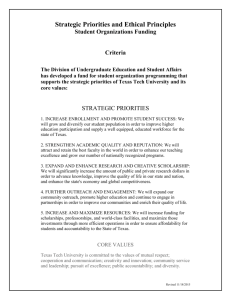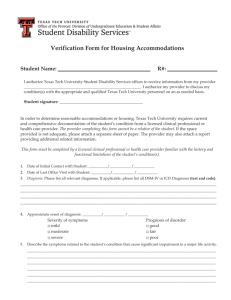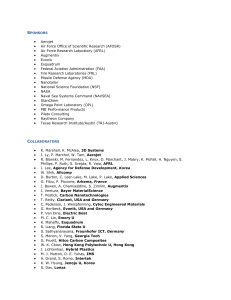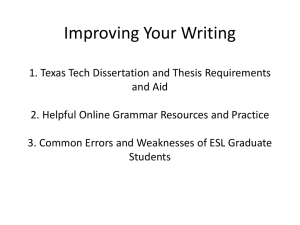general education committee meeting
advertisement
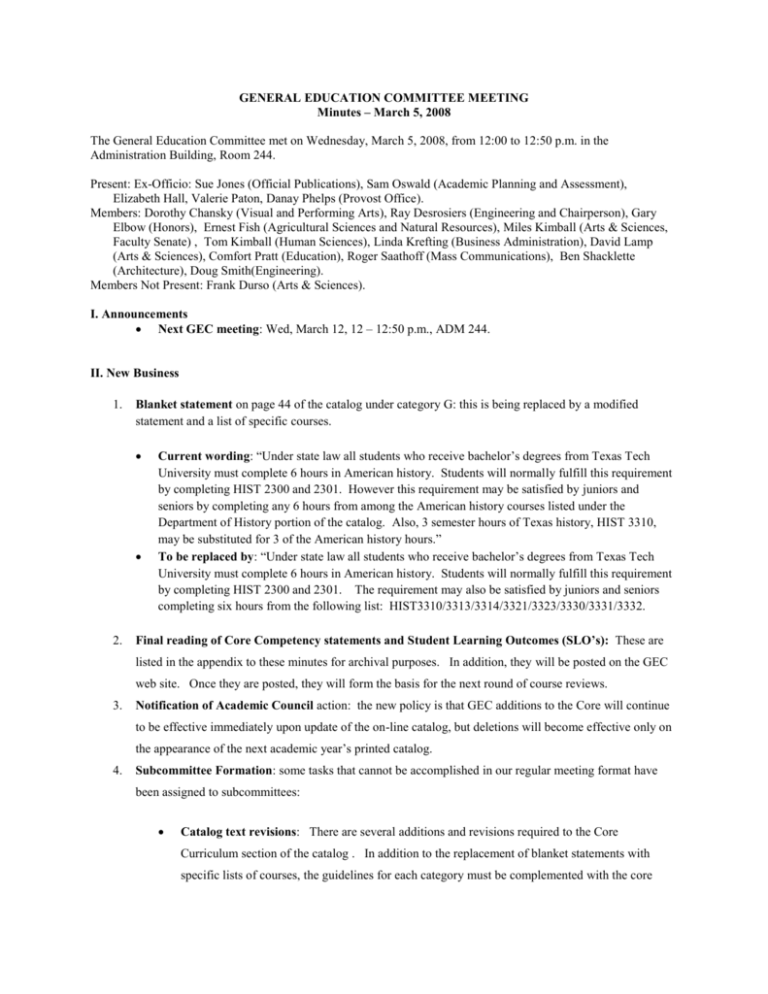
GENERAL EDUCATION COMMITTEE MEETING Minutes – March 5, 2008 The General Education Committee met on Wednesday, March 5, 2008, from 12:00 to 12:50 p.m. in the Administration Building, Room 244. Present: Ex-Officio: Sue Jones (Official Publications), Sam Oswald (Academic Planning and Assessment), Elizabeth Hall, Valerie Paton, Danay Phelps (Provost Office). Members: Dorothy Chansky (Visual and Performing Arts), Ray Desrosiers (Engineering and Chairperson), Gary Elbow (Honors), Ernest Fish (Agricultural Sciences and Natural Resources), Miles Kimball (Arts & Sciences, Faculty Senate) , Tom Kimball (Human Sciences), Linda Krefting (Business Administration), David Lamp (Arts & Sciences), Comfort Pratt (Education), Roger Saathoff (Mass Communications), Ben Shacklette (Architecture), Doug Smith(Engineering). Members Not Present: Frank Durso (Arts & Sciences). I. Announcements Next GEC meeting: Wed, March 12, 12 – 12:50 p.m., ADM 244. II. New Business 1. Blanket statement on page 44 of the catalog under category G: this is being replaced by a modified statement and a list of specific courses. 2. Current wording: “Under state law all students who receive bachelor’s degrees from Texas Tech University must complete 6 hours in American history. Students will normally fulfill this requirement by completing HIST 2300 and 2301. However this requirement may be satisfied by juniors and seniors by completing any 6 hours from among the American history courses listed under the Department of History portion of the catalog. Also, 3 semester hours of Texas history, HIST 3310, may be substituted for 3 of the American history hours.” To be replaced by: “Under state law all students who receive bachelor’s degrees from Texas Tech University must complete 6 hours in American history. Students will normally fulfill this requirement by completing HIST 2300 and 2301. The requirement may also be satisfied by juniors and seniors completing six hours from the following list: HIST3310/3313/3314/3321/3323/3330/3331/3332. Final reading of Core Competency statements and Student Learning Outcomes (SLO’s): These are listed in the appendix to these minutes for archival purposes. In addition, they will be posted on the GEC web site. Once they are posted, they will form the basis for the next round of course reviews. 3. Notification of Academic Council action: the new policy is that GEC additions to the Core will continue to be effective immediately upon update of the on-line catalog, but deletions will become effective only on the appearance of the next academic year’s printed catalog. 4. Subcommittee Formation: some tasks that cannot be accomplished in our regular meeting format have been assigned to subcommittees: Catalog text revisions: There are several additions and revisions required to the Core Curriculum section of the catalog . In addition to the replacement of blanket statements with specific lists of courses, the guidelines for each category must be complemented with the core competency statements. Volunteers for this committee are Comfort Pratt, David Lamp, Doug Smith. Ex-officio members Valerie Paton and Sue Jones will serve as consultants. Text for the GEC web site: the content needs to be updated. The task for this committee is to compose a clear mission statement for the GEC, and select the order and flow of required items such as membership, operating procedures, Core category competency statements, SLO’s, and guidelines for the submission of course syllabi. As announced in a previous meeting, the GEC web site will have a new feature added: a document upload capability. Faculty teaching courses in the Core will be required to submit a detailed syllabus each term. Volunteers for this committee are Miles Kimball, Tom Kimball, and Roger Saathoff. Ex-officio member Sam Oswald will serve as a consultant to the committee. Course Review Procedure: the recent focus on assessment requires that a new procedure for performing course reviews be developed that can be applied as objectively as possible. The final result is envisioned as another document to be posted on the GEC web site to enable faculty designing syllabi for Core courses to be fully cognizant of how a course will be reviewed. Volunteers for this committee are Linda Krefting, Gary Elbow, Ben Shacklette and Dorothy Chansky. 5. The meeting adjourned at 12:50. Appendix to the General Education Committee Minutes for Mar 5, 2008 STUDENT LEARNING OUTCOMES AND CORE COMPETENCY STATEMENTS o Communication – Demonstrate the ability to specify audience and purpose and to make appropriate communication choices. Demonstrate the ability to apply appropriate form and content in written, visual, and oral communication. Demonstrate the ability to apply basic principles of critical thinking, problem solving and technical proficiency in the development and documentation of exposition and argument. Students graduating from Texas Tech University should be able to: demonstrate the ability to specify audience and purpose and to make appropriate communication choices. o Humanities – Identify methodologies of historical, literary, philosophical, and/or aesthetic research and recognize their applicability to everyday life. Develop analytical arguments in written and/or oral forms. Evaluate events, ideas, and artistic expressions in terms of multiple cultural contexts and value systems. Demonstrate ways in which the humanities are fundamental to the health and survival of any society. Students graduating from Texas Tech University should be able to: think critically. demonstrate an understanding of the possibility of multiple interpretations, cultural contexts, and values. o Mathematics – Apply arithmetic, algebra, geometry and statistics to solve problems. Represent and evaluate basic mathematical information numerically, graphically, and symbolically. Use mathematical and logical reasoning to evaluate the validity of an argument. Interpret mathematical models such as formulas, graphs, tables and schematics, and draw inference from them. Students graduating from Texas Tech University should be able to: demonstrate the ability to apply quantitative and logical skills to solve problems. o Multicultural – Demonstrate awareness and knowledge of cultural differences within one or more distinctive sub-cultures of the United States, or Demonstrate awareness and knowledge of cultural differences within one of more global societies (Outside the U.S.) Students graduating from Texas Tech University should be able to: demonstrate awareness and knowledge of distinctive cultures or sub-cultures. o Natural Sciences – Demonstrate knowledge of the scientific method and to contrast it with other ways of understanding the world. Demonstrate knowledge of the tools and methods used by scientists to study the natural world. Explain some of the major theories in the Natural Sciences. Describe how Natural Sciences research informs societal issues, including ethics. Students graduating from Texas Tech University should be able to: explain some of the major concepts in the Natural Sciences and to demonstrate an understanding of scientific approaches to problem solving, including ethics. o Social and Behavioral Science – Identify and critique alternative explanations for claims about social issues and human behavior. Demonstrate knowledge of the appropriate methods, technologies, and data that social and behavioral scientists use to investigate the human condition. Identify and appreciate differences and commonalities among cultures. Demonstrate knowledge of the origins and evolution of U.S. and Texas political systems. Students graduating from Texas Tech University should be able to: demonstrate the ability to assess critically claims about social issues, human behavior, and diversity in human experiences. o Technology and Applied Science – Demonstrate understanding of how the rapid pace of change in technology and applied science may have good and bad outcomes. Describe examples of ethical implications associated with use of technology and applied science. List and evaluate reasons why human-designed systems, products, and environments need to be monitored, maintained, and improved to ensure safety, quality, cost efficiency, and sustainability. Students graduating from Texas Tech University should be able to: demonstrate understanding of how Technology and Applied Science affects society and the environment; and demonstrate understanding of the relationship of ethics and technology o Visual & Performing Arts – Identify and describe a body of works (individually and collectively) in the creative arts. Explain and differentiate creative works as expressions of values within cultural and historical contexts. Analyze and summarize aesthetic principles that structure creative works. Students graduating from Texas Tech University should be able to: construct, present, and defend critical and aesthetic judgments of works in the creative arts
